- Home
- Wendell Berry
A Place in Time Page 2
A Place in Time Read online
Page 2
She would remember all her life the threatful or wanton or heartless things she saw during the years of the war, and in fact during many years following—unofficial acts of violence as surely permitted by the war as if they had been determined by policy. The war also had given her two visions of such acts which she had not seen, but which she saw in her mind in such detail that she might as well have seen them with her eyes.
She could see, she would see all her life, her brother Galen on the bay gelding known as Rex, starting to a place near Smallwood where a company of Confederate volunteers was known to be gathering. He was senior to Rebecca by eleven years and therefore, to her, a mature man. But in her vision of him, as she grew older, he became younger, until the day when, in her never-finished sorrow, the realization would come: “He was just a boy!”
He sat well on his horse. He rode alone and—as she saw, as in her vision she increasingly understood—his face had a certain solemnity as if, the hesitance and effort of his decision now behind him, he felt himself a man fated to war—though not, surely, a man fated to be killed in that moment, before he could breathe again.
The family knew who did it, though there was no witness, no avowal, no evidence that was indisputable. And so the story she knew was not the story only of her brother, but in her vision he was alone, and when she heard the shot it surprised her. Every time the vision returned to her in the night or in the daytime when she sat alone the shot surprised her—for she saw each time that Galen anticipated nothing, was aware perhaps of nothing but himself and his horse passing on their way. It seemed to her that Galen did not hear the shot. He fell at once and cleanly from the saddle, delivered out of time without even a suspicion of the cause. The ones who happened upon his body found the horse nearby, grazing along the roadside.
The second vision was from the fall of 1863, more than two years after the first. Several slaves, five or six of them, both men and women, were cutting and shocking corn by moonlight out on the Bird’s Branch Road, not far from the church. In her vision she saw them plainly, working steadily along to the rhythm that their corn knives hacked into the rustling of the dry corn. They were singing. They were singing, “Freedom! Oh, freedom!” That was all the song, but they sang it back and forth among themselves. Sometimes they would fall silent, and then the song continued unsung to the beat of the knives. And then a solitary voice would lift into the moonlight, “Oh, freedom!” and then they would all sing, “Freedom! Oh, freedom!” a cry that was old and creaturely and human. Later she would imagine that there had rarely been a time, and in Port William after slavery perhaps never again a time, when the word “freedom” had been so understandingly sounded. As the singers sang, they worked. As they worked, the rows of standing corn slowly became fewer and the rows of shocks increased. Over the striking of the knives and the steady rustling of the corn and the singing, the moonlight fell as if a greater silence were thus made visible.
And Rebecca saw too, following the narrow road up the rise from the church, another of the little bands of hostile men that in those years crisscrossed the neighborhood, leaving it each time, it seemed to her, worse than it had been before, just as they crisscrossed also her own mind, leaving it each time sadder and yet stronger and less to be fooled.
There was no question who these were, for the people of Port William had come by various ways to know for certain. These were Confederate cavalry, six men and an officer. Their presence was perhaps accountable by some minor event or accident of the war, and yet, to her own mind, it was factual without being explainable. They simply were there, alien and unbelonging, as they had been wherever they had come from, as they would be wherever they would go, like all the others who had been displaced by the unaiming destiny of the bunch.
As they came up along the corn rows and into the sound of the Negroes’ singing and understood it, that word rising as if by nature out of bondage, the officer abruptly spurred his horse, put him to the rock fence beside the road, and neatly cleared it. He rode in among the crew of workers—they were scattering, running like quail into the standing corn. Drawing his pistol, he shot the eldest of them, a slave man named Tucker, point-blank in the side of the head.
It was no wonder that her time to marry came late for a young woman of Port William. It came when she was twenty-four, seven years after the formal, the “historical,” ending of the war. The nighttime reprisals of vengeful men—the unofficial violence set loose and still nominally justified by official violence—were still terrorizing the country. Her own repugnance and disdain persisted in those years of official peace. She would not be wedded, she could hardly bear to be looked at, by the young men of her own place, every one of whom seemed to her to bear the taint of what she called ever after “that awfulness.” She married instead an Irish immigrant who, to escape the bunch-violence that ruled his own land, had come to America and, hearing that a “shoe cobbler” was needed, finally to Port William.
Though she was old enough in that summer of 1864 for a Port William girl to be married, the awfulness already had driven any thought of courtship or marriage from her mind. She had instead taken a defensive stand on the side merely of the helpless and the threatened. On their behalf she distrusted all the creatures of the bunches and the weapons. That was why she sat still in her fear and watched as the alien riders, in the absence or invisibility of the entire membership of the town, occupied and ruled over the empty road.
And then, seeing nothing easily to be taken or enjoyed, they began to give the place up. They gathered again in the road and formed raggedly a line, resuming the direction that would carry them on through the town and finally into the river valley.
Looking away then in the direction they were going to go, she saw hanging over the river a single small white cloud just touched by the gold of the weakening sun. And then she saw, as if wonder must now be added to the new normality of outrage, the figure of a walking man emerge into the open concavity of the road as it came up out of the valley and turned toward the town. She knew immediately who it was, as she might have recognized at a distance too far for reading the character of her own script. It was Eli, her mother’s slave, with a split basket on his arm, bringing to her and Dicey, she supposed, some gift of food. Alone, old and ambling, visible against the bare horizon as the chimney of a burned house, he would be at the mercy of the riders, who had not yet seen him, though they would see him as soon as they looked. They would surround him on their horses. They would point their guns at him for the pleasure of seeing him frightened. They would demand the basket. Or worse. They could do worse. They could do as they pleased.
In her mind a thought like a prayer cried out: “Eli! Get out of sight!”
She looked quickly at the line of riders now coming up even with her window, and then quickly back at Eli. For another wonder, he had seen them first. Exactly as if he had heard her unspoken warning, he had vanished.
Relieved, she now looked only at the line of riders as one by one they straggled by. Their horses were fairly fit and of fairly good stock. The men in general rode them well enough, with an evident sense of their power, even maybe of pomp, and yet still she felt their strangeness, the strangeness of their ability now, in their bunch, to do as they pleased. They were like biting dogs. Emboldened by the fear they had caused, they longed for pursuit, but they had found as yet nobody to pursue.
They had almost gone by. She had almost relaxed her strict vigilance over her fear—her courage, though she had not called it so, that had kept her sitting and watching. She was ready to stand up, shake herself, and go to find Dicey and the children, when the last of the line of riders glanced up and saw her.
He stopped his horse, turned him to face the house, and sat looking up at her. Having recovered her stillness, pressing firmly downward within herself the physical tremor of her fright, she looked back at him. He was a young man with a curly, sand-colored beard. To somebody else, or in different circumstances, he might have seemed even, in his fashion, a hand
some young man. But she feared him and she hated him, and without flinching she looked back at him.
She thought, and the thought was familiar to her, how easy it would have been, if she had had a gun, if she had placed herself a few feet back in the shadowy room, to have shot him dead. And then she thought immediately, for this thought also was familiar, of the endlessness of such an act, or of its many ends multiplying unforeseeably forever. Maybe it was that thought that kept most people out of the way of such acts, when they could keep out of the way of them.
She knew she was daring him. She meant her facing him, her looking back, to be merely a refusal to be cowed by him. But she knew, she felt, the boldness even of so quiet a refusal. The deliberate impassivity of her face he would see as impudent. He would be challenged by it. He could, if he wished, shoot her and get clean away, unwitnessed, his shot not necessarily causing his companions even to look back.
His reprisal, though not violent, though it did not cause her to move or change expression, was nonetheless shocking to her, for it was just as unexpected as she expected it to be. He said without raising his voice, in perfect contempt, “Get your ugly face out of that window.”
Though for some time she continued to watch him, defying him, for she trembled now with the knowledge that she gladly would have killed him, he went on and did not look back.
Finally she allowed herself to look away. She willed herself free of her anger and her fear. She allowed the familiar room and all the house, quiet and warm and shadowy, to come round her again. Old Eli, wherever he was out there in the dimming country, was safe. The household and the town still were silent. Chances were there would be no human sound again until morning.
She got up from her chair. She would go now to find the others. They would fix supper and eat. They would let another evening come upon them. They would sleep.
As she went by the mirror on her dresser, she paused a moment and looked in. Unlike her mother, but as her daughter Margaret would be in her turn, she was a young woman of principled modesty. She would not have liked to catch herself thinking of herself as beautiful, though she was. But she did think, articulating the words deliberately as if saying them aloud: “That is not an ugly face.”
Fly Away, Breath (1907)
Andy Catlett keeps in his mind a map of the country around Port William as he has known it all his life and as he has been told about it all his life from times and lives before his. There are moments, now that he is getting old, when he seems to reside in that country in his mind even as his mind still resides in the country.
This is the country of his own life and history, fragmentary as they necessarily have been. It is his known country. And perhaps it differs also from the actual, momentary country insofar as time is one of its dimensions, as reckonable in thought as length and breadth, as air and light. His thought can travel like a breeze over water back and forth upon the face of it, and also back and forth in time along its streams and roads.
As in thought he passes backward into time, the country becomes quieter, and it seems to grow larger. The sounds of engines become less frequent and farther apart until finally they cease altogether. As the roads get poorer or disappear, the distances between places seem to grow longer. Distances that he can now travel in minutes in an automobile once would have taken hours and much effort.
But it is possible, even so, to look back with a certain fondness to a time when the sounds of engines were not almost constant in the sky, on the roads, and in the fields. Our descendants may know such a time again when the petroleum all is burnt. How they will fare then will depend on the neighborly wisdom, the love for the place and its genius, and the skills that they may manage to revive between now and then.
The country in Andy Catlett’s mind has assuredly a past, which exists in relics and scraps of memory more or less subject to proof. It has presumably a future that will verify itself only by becoming the past. Its present is somewhat conjectural, for old Andy Catlett, like everybody else, cannot be conscious of the present while he is thinking of the past. And most of us, most of the time, think mostly of the past. Even when we say, “We are living now,” we can mean only that we were living a moment ago.
Nevertheless, in this sometimes horrifying, sometimes satisfying, never-sufficiently-noticed present, between a past mostly forgotten and a future that we deserve to fear but cannot predict, some few things can be recalled.
In all the country from Port William to the river, one light shines. It is from a flame on the wick of an oil lamp, turned low, on a little stand table at the bedside of Maximilla Dawe in a large unpainted house facing the river in Glenn’s Bottom between Catlett’s Fork and Bird’s Branch. The old lady lies somewhat formally upon the bed, seemingly asleep, in a long-sleeved flannel nightgown, clean but not new, the covers laid neatly over her. Her arms lie at her sides, the veined and gnarled old hands at rest. She is propped, in the appearance at least of comfort, on several pillows, for she is so bent by age and work that she could not lie flat.
She has been old a long time. Though “Maximilla” was inscribed in her father’s will, by which he left her the farm in the river bottom, the family of “the slave woman known as Cat,” and his stopped gold watch, and though it was signed in her own hand at the end of two or three legal documents, she was never well known even to herself by that name. Once upon a time she was “Maxie”—“Miss Maxie” to the Negroes and some whites. For at least as long, to herself as to all the neighborhood of Port William, she has been “Aunt Maxie.” To her granddaughter, who was Andy Catlett’s grandmother, she had always been “Granny Dawe,” as to Andy she still is known.
Andy’s grandmother, born Margaret Finley, now Margaret Feltner, sits by the bedside of Granny Dawe in that room in the dim lamplight in the broad darkness of the river valley in the fall of 1907, a hundred years ago. Margaret Feltner is a pretty woman—or girl, as the older women still would have called her—with a peculiar air of modesty, for she knows she is pretty but would prefer not to be caught knowing it. She is slenderly formed and neatly dressed, even prettily dressed, for her modesty must contend also with her knowledge that her looks are pleasing to Mat Feltner, her young husband.
With her are three other young women, also granddaughters of the old woman on the bed. They are Bernice Gibbs, and Oma and Callie Knole. Kinswomen who know one another well, they sit close together, leaving a sort of aisle between their chairs and the bed.
Their voices are low, and their conversation has become more and more intermittent as the night has gone on. The ancient woman on the bed breathes audibly, but slowly too and tentatively, so that they who listen even as they talk are aware that at any moment there may be one more breath, and then no more.
But she is dying in no haste, this Aunt Maxie, this Granny Dawe, who lived and worked so long before she began to die that she was the only one alive who still knew what she had known. She was born in 1814 in the log house that long ago was replaced by the one in which she now is dying. At the time of her birth, the Port William neighborhood was still in its dream of itself as a frontier, “the West,” a new land. The chief artery of trade and transportation for that part of the country then was the river, as it would be for the next hundred years. When the time came, she bestowed her land, her slaves, and herself upon a man named James John Dawe, whose worldly fortune consisted of a singular knack for trade and the store and landing, the port of Port William, known as Dawe’s Landing. He left the care of the farm to her. With the strength and the will and the determined good sense that have kept the farm and household in her own hands until now, she ruled and she served through times that were mostly hard.
The Civil War had its official realization in movements of armies and great battles in certain places, but in places such as Port William it released and licensed an unofficial violence also terrible, and more lasting. At its outset, Galen Dawe, on his way to join the Confederate army, was shot from his horse and left dead in the road, no farther on his way
than Port William, by a neighbor, a Union sympathizer, with whom he had quarreled. And Maxie Dawe, with the help of a slave man named Punkin, loaded the dead boy onto a sled drawn by a team of mules. Looking neither right nor left at those who watched, she brought home the mortal body of her one son, which she washed and dressed herself, and herself read the great psalm over him as he lay in his grave.
The rest of her children were daughters, four of them. Her grief and her bearing in her grief gave her a sort of headship over daughters and husband that they granted without her ever requiring it. When a certain superiority to suffering, a certain indomitability, was required, she was the one who had it. Later, when a band of self-denominated “Rebel” cavalry hung about the neighborhood, she saved her husband, the capable merchant James John, from forcible recruitment or murder, they never knew which, by hiding him three weeks in a succession of corn shocks, carrying food and water to him after dark. By her cunning and sometimes her desperate bravery, she brought her surviving family, her slaves, and even a few head of livestock through the official and the unofficial wars, only to bury her husband, dead of a fever, at the end of the official one.
When the slaves were freed in Kentucky, when at last she had heard, she gathered those who had been her own into the kitchen. She told them: “Slavery is no more, and you are free. If you wish to stay and share our fate, you are free to stay, and I will divide with you as I can. If you wish to go, you are free to go.”
There were six of them, the remaining family of the woman known as Cat, and they left the next morning, taking, each of them, what could be carried bundled in one hand, all of them invested with an official permission that had made them strange to everything that had gone before. They left, perhaps, from no antipathy to staying, for they arrived in Hargrave and lived there under the name of Dawe—but how could they have known they were free to go if they had not gone? Or so, later, Maxie Dawe would explain it, and she would add, “And so would I have, had it been me.”

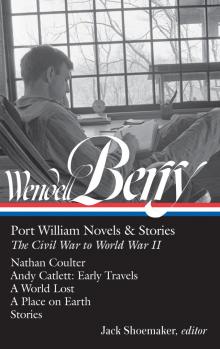 The Selected Poems of Wendell Berry
The Selected Poems of Wendell Berry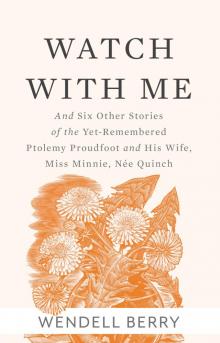 Watch With Me
Watch With Me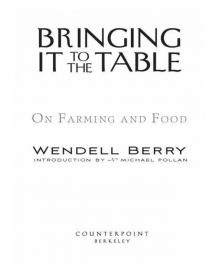 Bringing It to the Table: On Farming and Food
Bringing It to the Table: On Farming and Food Hannah Coulter
Hannah Coulter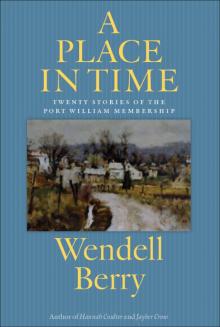 A Place in Time: Twenty Stories of the Port William Membership
A Place in Time: Twenty Stories of the Port William Membership Nathan Coulter
Nathan Coulter Why I Am Not Going to Buy a Computer
Why I Am Not Going to Buy a Computer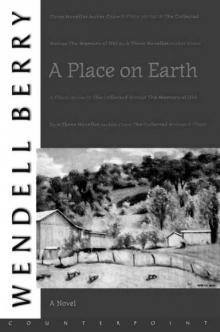 A Place on Earth
A Place on Earth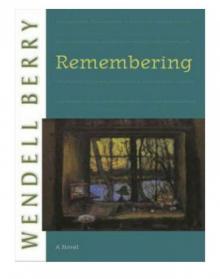 Remembering
Remembering New Collected Poems
New Collected Poems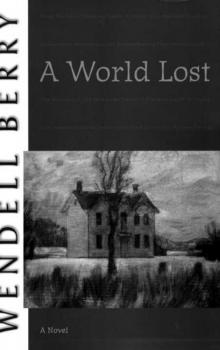 A World Lost
A World Lost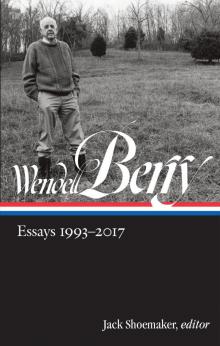 Wendell Berry
Wendell Berry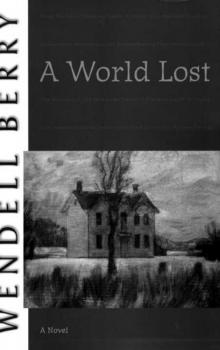 A World Lost: A Novel (Port William)
A World Lost: A Novel (Port William)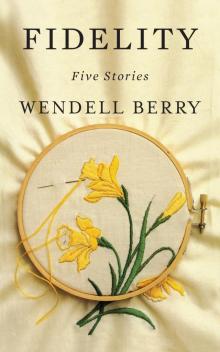 Fidelity
Fidelity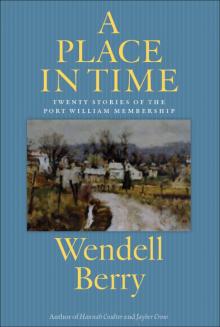 A Place in Time
A Place in Time